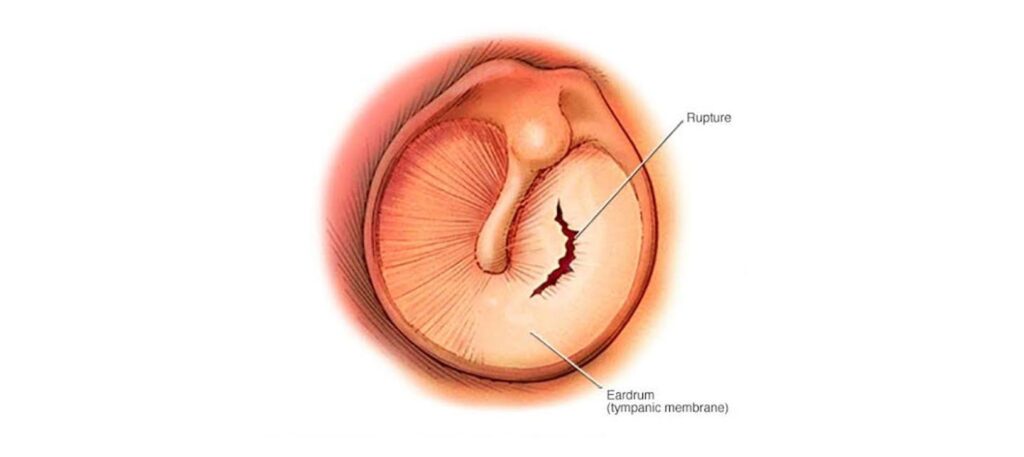Perforation In Ear
Services > Perforation In Ear
Ent Doctors
Ear
- Vertigo
- Ear Wax
- Ear Pain
- Ear Infections
- Ear Cholesteatoma
- Acoustic Neuroma
- Torn Ear Lobes
- Perforation In Ear
- Ototoxicity
- Otitis Media
- Mastoiditis
- Hearing loss
- Foreign bodies in the ear
NOSE
- Rhinoplasty
- Breathing Problems
- Foreign bodies in nose
- Nasal Bone Fracture
- Nasal Septum
- Nasal Polyp
- Nasal Deformity
- Nosal Allergy Clinic
- Nose Bleeding Treatment
- Sinus Treatment
- Chronic Sinusitis
- Adenoidectomy
THROAT
- Voice Disorders
- Salivary gland problems
- Papillary Thyroid Carcinoma
- Oral and Throat problems
- Laryngeal Vocal Nodules
- Laryngeal Vocal Cord Palsy
- Foreign body in esophagus
- Foreign body in bronchus
- Difficulty in Swallowing
- Cancer of the Larynx
Audiology
Voice Clinic
Snoring and Sleeping Apnea
- Sleep Apnea
- Snoring Treatment
Maxillofacial Clinic
Cancer Clinic
- Head & Neck Cancer
- Thyroid Cancer / Papillary Carcinoma
Goiter Treatment

Ruptured Eardrum
Your eardrum (tympanic membrane) has two primary roles:
- Hearing: When sound waves strike it, your eardrum vibrates — the first step by which structures of your middle and inner ears translate sound waves into nerve impulses.
- Protection: Your eardrum also acts as a barrier, protecting your middle ear from water, bacteria and other foreign substances.
A ruptured eardrum (tympanic membrane perforation) is a hole or tear in the thin tissue that separates your ear canal from your middle ear (eardrum).
A ruptured eardrum can result in hearing loss. It can also make your middle ear vulnerable to infections.
A ruptured eardrum usually heals within a few weeks without treatment. But sometimes it requires a patch or surgical repair to heal.
What are the symptoms of Perforation In Ear?
Signs and symptoms of a ruptured eardrum may include:
- Ear pain that may subside quickly
- Mucuslike, pus-filled or bloody drainage from your ear
- Hearing loss
- Ringing in your ear (tinnitus)
- Spinning sensation (vertigo)
- Nausea or vomiting that can result from vertigo
Eardrum Perforation Reasons
- Middle ear infection (otitis media). A middle ear infection often results in the accumulation of fluids in your middle ear. Pressure from these fluids can cause the eardrum to rupture.
- Barotrauma. Barotrauma is stress exerted on your eardrum when the air pressure in your middle ear and the air pressure in the environment are out of balance. If the pressure is severe, your eardrum can rupture. Barotrauma is most often caused by air pressure changes associated with air travel. Other events that can cause sudden changes in pressure — and possibly a ruptured eardrum — include scuba diving and a direct blow to the ear, such as the impact of an automobile airbag.
- Loud sounds or blasts (acoustic trauma). A loud sound or blast, as from an explosion or gunshot — essentially an overpowering sound wave — can rarely cause a tear in your eardrum.
- Foreign objects in your ear. Small objects, such as a cotton swab or hairpin, can puncture or tear the eardrum.
- Severe head trauma. Severe injury, such as a skull base fracture, may cause the dislocation of or damage to middle and inner ear structures, including your eardrum.
Eardrum Perforation Complications
If your eardrum ruptures, uncommon problems can occur, especially if it fails to self-heal after three to six months. Possible complications include:
- Hearing loss: Usually, hearing loss is temporary, lasting only until the tear or hole in your eardrum has healed. The size and location of the tear can affect the degree of hearing loss.
- Middle ear infection (otitis media): A ruptured (perforated) eardrum can allow bacteria to enter the ear. If a perforated eardrum doesn’t heal, a small number of people may be vulnerable to ongoing (recurrent or chronic) infections. In this small group, chronic drainage and hearing loss can occur.
- Middle ear cyst (cholesteatoma): Although very rare, this cyst, which is composed of skin cells and other debris, can develop in your middle ear as a long-term result of eardrum rupture.

